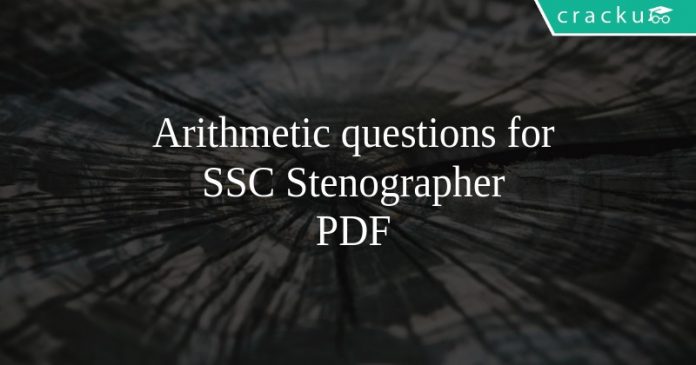Arithmetic questions for SSC Stenographer PDF
SSC Stenographer Arithmetic questions and answers pdf based on previous year question papers of SSC exam. Top 15 Very important questions for Stenographer.
Download Arithmetic questions for SSC Stenographer PDF
15 Stenographer Mock Tests – Just Rs. 149
Download All Important SSC Stenographer Questions PDF (Topic-Wise)
Question 1: Find the value of p if 3x + p, x – 10 and -x + 16 are in arithmetic progression.
a) 16
b) 36
c) -16
d) -36
Question 2: If 9/4th of 7/2 of a number is 126, then 7/2th of that number is …………..
a) 56
b) 284
c) 72
d) 26
Question 3: The 4th term of an arithmetic progression is 15, 15th term is -29, find the 10th term?
a) -5
b) -13
c) -17
d) -9
SSC STENOGRAPHER PREVIOUS PAPERS
SSC Stenographer Free Mock Test
Question 4: (91 + 92 + 93 + ……… +110) is equal to
a) 4020
b) 2010
c) 6030
d) 8040
Question 5: If 6/7th of 8/5th of a number is 192, then 3/4th of that number is .———–
a) 105
b) 77
c) 36
d) 80
Question 6: 40.36 – (9.347 – x ) – 29.02 = 3.68. Find x.
a) -56.353
b) 1.687
c) -17.007
d) 82.407
Question 7: What is the value of (81 + 82 + 83 + ……… +130)?
a) 5275
b) 10550
c) 15825
d) 21100
SSC STENOGRAPHER PREVIOUS PAPERS
SSC Stenographer Free Mock Test
Question 8: In an arithmetic progression if 13 is the 3rd term, 47 is the 13th term, then 30 is which term?
a) 9
b) 10
c) 7
d) 8
Question 9: If 4/5th of 6/7th of a number is 216, then 8/9th of that number will be
a) 179
b) 280
c) 160
d) 269
Question 10: 199994 x 200006 = ?
a) 39999799964
b) 39999999864
c) 39999999954
d) 39999999964
Question 11: In an arithmetic progression, if 17 is the 3rd term, -25 is the 17th term, then -1 is which term?
a) 10
b) 11
c) 9
d) 12
Question 12: In an arithmetic progression, if 9 is the 5th term, -26 is the 12th term, then -6 is which term?
a) 11
b) 8
c) 10
d) 7
Question 13: 2*[0.3(1.3 + 3.7)] of 0.8 = ?
a) 1.92
b) 0.72
c) 2.16
d) 2.4
Question 14: Find the value of p, if 2x – 4, 4x + p and 6x – 12 are in arithmetic progression.
a) -9
b) -10
c) -11
d) -8
Question 15: If 7/8th of 5/4th of a number is 315, then 5/9th of that number is _____ .
a) 123
b) 81
c) 140
d) 160
SSC Stenographer Previous Papers
SSC STENOGRAPHER STUDY MATERIAL TOPIC-WISE
Answers & Solutions:
1) Answer (D)
Terms in arithmetic progression : $(3x + p) , (x – 10) , (-x + 16)$
=> Difference between first two terms is equal to the difference between last two terms
=> $(x – 10) – (3x + p) = (-x + 16) – (x – 10)$
=> $-2x -10 – p = -2x + 16 + 10$
=> $-p = 26 + 10 = 36$
=> $p = -36$
=> Ans – (D)
2) Answer (A)
Let the number be $x$
According to ques,
=> $\frac{9}{4} \times \frac{7}{2} \times x = 126$
=> $\frac{63}{8} x = 126$
=> $x = \frac{126}{63} \times 8$
=> $x = 2 \times 8 = 16$
$\therefore (\frac{7}{2})^{th}$ of the number = $\frac{7}{2} \times 16$
= $7 \times 8 = 56$
=> Ans – (A)
3) Answer (D)
The $n^{th}$ term of an A.P. = $a + (n – 1) d$, where ‘a’ is the first term , ‘n’ is the number of terms and ‘d’ is the common difference.
4th term, $A_4 = a + (4 – 1) d = 15$
=> $a + 3d = 15$ —————–(i)
Similarly, 15th term, $A_{15} = a + 14d = -29$ ——————(ii)
Subtracting equation (i) from (ii), we get :
=> $(14d – 3d) = -29 – 15$
=> $d = \frac{-44}{11} = -4$
Substituting it in equation (i), => $a – 12 = 15$
=> $a = 15 + 12 = 27$
$\therefore$ 10th term, $A_{10} = a + (10 – 1)d$
= $27 + (9 \times -4) = 27 – 36 = -9$
=> Ans – (D)
4) Answer (B)
Expression : (91 + 92 + 93 + ……… +110)
This is an arithmetic progression with first term, $a = 91$ , last term, $l = 110$ and common difference, $d = 1$
Let number of terms = $n$
Last term in an A.P. = $a + (n – 1)d = 110$
=> $91 + (n – 1)(1) = 110$
=> $n – 1 = 110 – 91 = 19$
=> $n = 19 + 1 = 20$
$\therefore$ Sum of A.P. = $\frac{n}{2} (a + l)$
= $\frac{20}{2} (91 + 110)$
= $10 \times 201 = 2010$
5) Answer (A)
Let the number be $x$
According to ques,
=> $\frac{6}{7} \times \frac{8}{5} \times x = 192$
=> $\frac{48}{35} x = 192$
=> $x = \frac{192}{48} \times 35$
=> $x = 4 \times 35 = 140$
$\therefore (\frac{3}{4})^{th}$ of the number = $\frac{3}{4} \times 140$
= $3 \times 35 = 105$
=> Ans – (A)
6) Answer (B)
Expression : 40.36 – (9.347 – x ) – 29.02 = 3.68
=> 40.36 – 9.347 + x = 3.68 + 29.02
=> 31.013 + x = 32.7
=> x = 32.7 – 31.013
=> x = 1.687
=> Ans – (B)
7) Answer (A)
Expression : (81 + 82 + 83 + ……… +130)
This is an arithmetic progression with first term, $a = 81$ , last term, $l = 130$ and common difference, $d = 1$
Let number of terms = $n$
Last term in an A.P. = $a + (n – 1)d = 130$
=> $81 + (n – 1)(1) = 130$
=> $n – 1 = 130 – 81 = 49$
=> $n = 49 + 1 = 50$
$\therefore$ Sum of A.P. = $\frac{n}{2} (a + l)$
= $\frac{50}{2} (81 + 130)$
= $25 \times 211 = 5275$
8) Answer (D)
The $n^{th}$ term of an A.P. = $a + (n – 1) d$, where ‘a’ is the first term , ‘n’ is the number of terms and ‘d’ is the common difference.
3rd term, $A_3 = a + (3 – 1) d = 13$
=> $a + 2d = 13$ —————–(i)
Similarly, 13th term, $A_{13} = a + 12d = 47$ ——————(ii)
Subtracting equation (i) from (ii), we get :
=> $(12d – 2d) = 47 – 13 = 34$
=> $d = \frac{34}{10} = 3.4$
Substituting it in equation (i), => $a + 2 \times 3.4 = 13$
=> $a = 13 – 6.8 = 6.2$
Let $n^{th}$ term = 30
=> $a + (n – 1) d = 30$
=> $6.2 + (n – 1) (3.4) = 30$
=> $(n – 1) (3.4) = 30 – 6.2 = 23.8$
=> $(n – 1) = \frac{23.8}{3.4} = 7$
=> $n = 7 + 1 = 8$
9) Answer (B)
Let the number be $x$
According to ques,
=> $\frac{4}{5} \times \frac{6}{7} \times x = 216$
=> $x = 216 \times \frac{35}{24} = 9 \times 35$
$\therefore$ 8/9th of the number = $\frac{8}{9} \times (35 \times 9)$
= $8 \times 35 = 280$
=> Ans – (B)
10) Answer (D)
Expression : 199994 x 200006
= (200000 – 6) x (200000 + 6)
= $(200000)^2 – (6)^2$
= 40000000000 – 36 = 39999999964
=> Ans – (D)
11) Answer (C)
The $n^{th}$ term of an A.P. = $a + (n – 1) d$, where ‘a’ is the first term , ‘n’ is the number of terms and ‘d’ is the common difference.
3rd term, $A_3 = a + (3 – 1) d = 17$
=> $a + 2d = 17$ —————–(i)
Similarly, 17th term, $A_{17} = a + 16d = -25$ ——————(ii)
Subtracting equation (i) from (ii), we get :
=> $(16d – 2d) = -25 – 17$
=> $d = \frac{-42}{14} = -3$
Substituting it in equation (i), => $a – 6 = 17$
=> $a = 17 + 6 = 23$
Let $n^{th}$ term = -1
=> $a + (n – 1) d = -1$
=> $23 + (n – 1) (-3) = -1$
=> $(n – 1) (-3) = -1 – 23 = -24$
=> $(n – 1) = \frac{-24}{-3} = 8$
=> $n = 8 + 1 = 9$
12) Answer (B)
The $n^{th}$ term of an A.P. = $a + (n – 1) d$, where ‘a’ is the first term , ‘n’ is the number of terms and ‘d’ is the common difference.
5th term, $A_5 = a + (5 – 1) d = 9$
=> $a + 4d = 9$ —————–(i)
Similarly, 12th term, $A_{12} = a + 11d = -26$ ——————(ii)
Subtracting equation (i) from (ii), we get :
=> $(11d – 4d) = -26 – 9$
=> $d = \frac{-35}{7} = -5$
Substituting it in equation (i), => $a – 20 = 9$
=> $a = 9 + 20 = 29$
Let $n^{th}$ term = -6
=> $a + (n – 1) d = -6$
=> $29 + (n – 1) (-5) = -6$
=> $(n – 1) (-5) = -6 – 29 = -35$
=> $(n – 1) = \frac{-35}{-5} = 7$
=> $n = 7 + 1 = 8$
13) Answer (D)
Expression : 2*[0.3(1.3 + 3.7)] of 0.8 = ?
= $2 \times (0.3 \times 5) \times 0.8$
= $10 \times 0.24 = 2.4$
=> Ans – (D)
14) Answer (D)
Terms in arithmetic progression : $(2x – 4) , (4x + p) , (6x – 12)$
=> Difference between first two terms is equal to the difference between last two terms
=> $(4x + p) – (2x – 4) = (6x – 12) – (4x + p)$
=> $2x + p + 4 = 2x – 12 – p$
=> $2p = -12 – 4 = -16$
=> $p = \frac{-16}{2} = -8$
15) Answer (D)
Let the number be $x$
=> $\frac{7}{8} \times \frac{5}{4} \times x = 315$
=> $x = 9 \times 8 \times 4 = 32 \times 9$
$\therefore$ 5/9th of the number = $\frac{5}{9} \times 32 \times 9$
= 160
SSC Stenographer Free Mock Test
We hope this Arithmetic questions pdf for SSC Stenographer exam will be highly useful for your Preparation.





